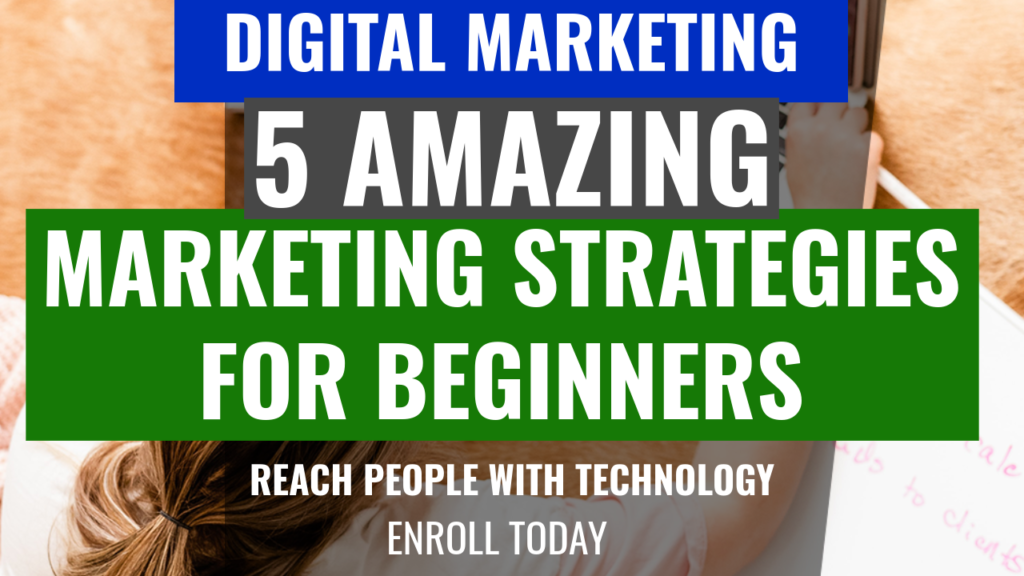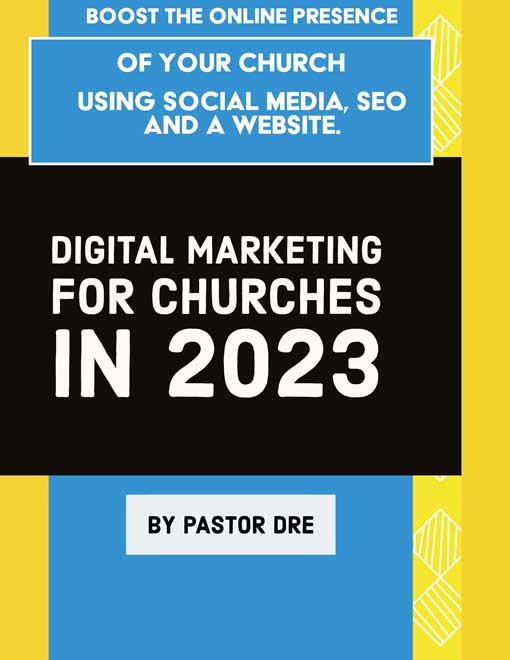Internet Marketing Strategies for Beginners: 5 Simple Strategies to Boost Your Online Presence.
In a world that is full of digital communication, a strong online presence is essential if you want to succeed in business. Internet marketing can seem overwhelming at first, but there are simple strategies that can boost your online presence and help you reach more customers.

In this blog post, we will discuss 5 effective internet marketing strategies that are easy to implement and perfect for beginners. From building a strong social media presence to creating valuable content for your website, these tips will help you take your digital online marketing game to the next level.
Whether you're a small business owner or a budding entrepreneur, read on to learn how you can enhance your online presence and grow your brand.
1. Define your target audience
One of the most important aspects of internet marketing is defining your target audience. Without understanding who you are trying to reach, your marketing efforts may not be as effective as they could be.
Your target audience should be a specific group of people who are most likely to be interested in your product or service.
In order to define your target audience, you should first consider factors such as age, gender, income level, education level, interests, and location.
By doing so, you can create a persona or profile that represents your ideal customer. Once you have a clear understanding of who your target audience is, you can tailor your marketing efforts to appeal to their interests and needs.
This can include creating content that speaks directly to them, using social media platforms that are popular among your target audience, and using targeted advertising to reach them where they are most likely to be online.
By defining your target audience and creating a marketing strategy that caters to their needs, you can boost your online presence and drive more traffic to your website.

FREE eBook Download
DIGITAL MARKETING for CHURCHES 2023 Edition
2. Create a social media strategy
Creating a social media strategy is an essential part of internet marketing for beginners.
With billions of people using social media platforms every day, it is crucial to have a strong presence on social media.
The first step in creating a social media strategy is to identify which platforms your target audience is using.
Once you have determined where your audience is, you can start creating content that is tailored to each platform.
For example, Instagram is a highly visual platform, so you should focus on creating eye-catching images and videos.
Facebook, on the other hand, is more text-focused, so you should focus on creating engaging and shareable written content. It's important to create a content calendar to ensure that you are consistently posting content that is relevant and engaging. You should also engage with your followers by responding to comments and messages, and creating a strong brand voice that resonates with your target audience.
By consistently posting high-quality content and engaging with your audience, you can build a strong social media presence that will help boost your online presence and grow your business.
Drive more traffic through digital marketing

Get access to our eBook digital marketing for churches and boost your online presence.
3. Content marketing for beginners
Content marketing is an essential part of any internet marketing strategy. It is all about creating valuable, relevant, and consistent content that will attract and retain a clearly defined audience. The content can range from blog posts, social media updates, videos, infographics, and other types of digital content.
The key is to create content that is useful and informative to your target audience. This will help establish you as an authority in your niche and will make it more likely for people to trust your brand.
When creating content for your website or social media, it's important to keep it concise and to the point. You want to provide your audience with the information they are looking for without overwhelming them.
Additionally, you should always make sure your content is optimized for search engines. This means including relevant keywords in your content, headlines, and meta descriptions.
Finally, promoting your content is essential. Social media platforms are a great way to share your content and attract new readers. By using content marketing, you can boost your online presence and establish your brand as a trustworthy and authoritative source in your niche.
4. Search engine optimization (SEO) basics
Search engine optimization (SEO) is an essential strategy for beginners in internet marketing. SEO helps search engines like Google understand the content on your website and rank it higher in search results.
The higher your website ranks in search results, the more likely people are to find it.
One of the most critical aspects of SEO is keyword research. You need to identify relevant keywords that your website should be targeting. These keywords should be included in your website's content, title tags, and meta descriptions.
You should also include your keywords in the URLs of your web pages.
Another important factor is the quality of your website's content. Your content should be original, informative, and engaging for your target audience. It should also be structured in a way that is easy for Google to understand.
Additionally, you should make sure that your website is mobile-friendly since Google prioritizes mobile-friendly websites in search results.
Finally, link building is a crucial aspect of SEO. You should aim to get other websites to link to your website since this can help increase your website's authority and improve its search engine rankings. By following these basic SEO strategies, you can boost your online presence and attract more visitors to your website.

FREE eBook Download
DIGITAL MARKETING for CHURCHES 2023 Edition
Conclusion:
If you're new to the world of digital marketing, it can be overwhelming to know where to start. However, there are several simple strategies that you can use to boost your online presence and reach more customers, even if you have no previous experience with digital marketing.
- Start with social media: Social media platforms like Facebook, Twitter, and Instagram are great places to start your digital marketing efforts. Create accounts on these platforms and start posting engaging content that your target audience will enjoy.
- Create a blog: Blogging is an excellent way to establish yourself as an expert in your field and drive traffic to your website. Start by creating a blog on your website and writing high-quality, informative posts that your target audience will find valuable.
- Utilize email marketing: Email marketing allows you to reach your target audience directly and can be an effective way to generate leads and sales. Start by building an email list and sending out regular newsletters or promotional offers.
- Invest in paid advertising: While organic traffic is important, paid advertising can help you reach a larger audience quickly. Google AdWords and Facebook Ads are two popular options for paid advertising.
- Analyze your results: To ensure that your digital marketing efforts are effective, it's important to track your results. Use tools like Google Analytics to track your website traffic and social media analytics to track engagement on your social media posts. This will help you identify what's working and what's not, so you can make adjustments to your strategy as needed.
Thank you for taking the time to read our blog. If you have questions please leave them in the comment section below. Looking forward to hearing from you.
Questions Others Are Asking About Digital Marketing
What are the 4 types of marketing strategies?
1. Product differentiation strategy: This strategy involves creating a unique selling proposition or differentiating features of a product or service from its competitors. This can be achieved through product innovation, design, packaging, or branding.
2. Cost leadership strategy: This strategy involves providing products or services at a lower cost than competitors, while maintaining quality. This can be achieved through efficient production processes, economies of scale, or cutting costs in areas such as marketing or distribution.
3. Niche marketing strategy: This strategy involves targeting a specific segment of the market with specialized products or services that meet the specific needs and preferences of that group. This may involve creating a unique product or service offering, or creating a distinct brand image and identity.
4. Mass marketing strategy: This strategy involves targeting a broad audience with a standardized product or service. This may involve creating a simple and easy-to-understand message that appeals to a large audience, or using mass media channels such as television or print advertising to reach a wide audience.
What are the basic marketing strategies
There are several basic marketing strategies, including:
1. Product differentiation: Highlighting a unique feature or benefit of a product to stand out from competitors.
2. Target marketing: Identifying and focusing on a specific audience or demographic that is most likely to purchase a product.
3. Social media marketing: Utilizing social media platforms to reach and engage with customers.
4. Content marketing: Creating valuable and informative content to attract and retain customers.
5. Email marketing: Sending promotional and informational emails to a targeted customer base.
6. Search engine optimization (SEO): Optimizing website content to improve search engine rankings and drive traffic.
7. Advertising: Using paid media channels such as TV, radio, print, or digital to promote a product or service.
8. Public relations: Building relationships with media outlets and stakeholders to increase positive visibility and brand reputation.
How do you create a marketing strategy for beginners?
1. Define your target market: Determine who your ideal customer is, their demographics, behaviors, and needs.
2. Research your competitors: Analyze what your competitors are doing right and wrong, and what sets you apart from them.
3. Set goals and objectives: Establish realistic and measurable goals for your marketing efforts.
4. Determine your budget: Decide how much you can spend, what resources you have, and where you'll allocate your funds.
5. Choose your channels: Identify which marketing channels you'll use (e.g., social media, email, SEO, PPC, content marketing).
6. Develop your messaging: Craft a compelling message that resonates with your target audience.
7. Create a content plan: Create a consistent and valuable content plan that aligns with your messaging and engages your audience.
8. Measure and optimize: Monitor your results and refine your strategy based on what works best.
How to do digital marketing for beginners?
1. Define your goals and target audience
2. Create a website or landing page
3. Optimize your website for search engines (SEO)
4. Build and maintain a strong social media presence
5. Engage with your audience through content marketing

